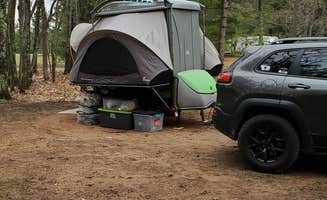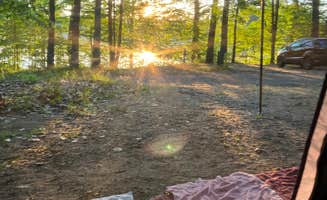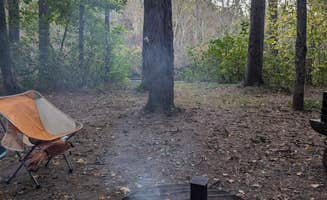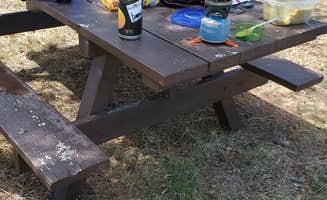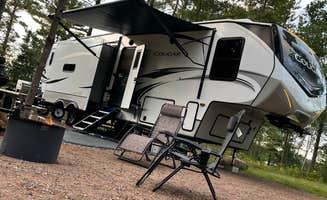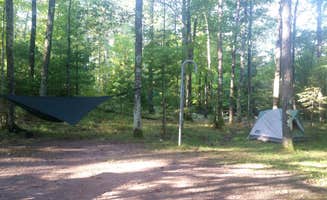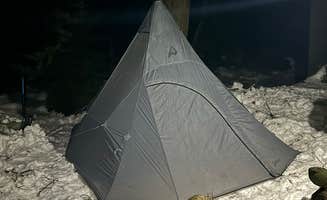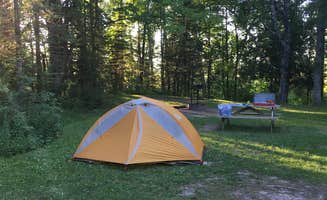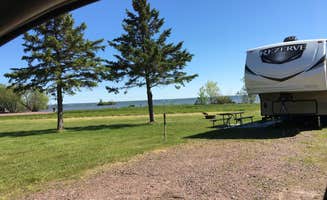The Iron River area offers camping options across northwestern Wisconsin's diverse landscape at approximately 1,200 feet elevation. Most sites sit within the Lake Superior watershed with sandy soil typical of the Northern Highland region. Water levels at boat launches fluctuate by 2-3 feet between spring and late summer, requiring adjustments for watercraft access.
What to do
Paddle the Brule River: At Copper Range, canoe rentals are available about a mile away in Brule at reasonable prices. "Perfect for fishing and kayaking the Brule River," notes Cora H., who appreciated the space between campsites. The river features dedicated canoe landings with racks for equipment storage.
Explore waterfalls year-round: Amnicon Falls State Park provides multiple waterfall viewing areas accessible even in winter months. "A beautiful, smaller park. We tent camped with our littles (2 & under) & they had a blast walking & sitting in the water near the Falls. There are countless locations on the Falls for your family to get cozy & enjoy the water," writes KampW/Babies.
Access ATV trail systems: Several campgrounds connect directly to the area's extensive ATV trail network. A camper at Moon Lake City Park explains it's "Right on the ATV trails. Great jumping off spot for a great North Woods adventure."
What campers like
Private beach access: Top O' the Morn Resort offers lakefront camping with swimming amenities. Beth B. reports, "Lake has swimming area and swim platform, it's a lake so there are small fish, snails and grass in that area." Sites feature substantial spacing between neighbors for added privacy.
Wildlife viewing opportunities: Early mornings and evenings provide prime wildlife spotting times, especially for birdwatchers. Katherine O. mentioned at Top O' the Morn Resort, "Saw a lot of wildlife and heard the sounds of loons in the AM and evening." Red squirrels are commonly spotted at Copper Range, with one camper sharing, "Also the cutest red squirrels EVERYWHERE!"
Fishing access: Twin Bear Campground provides access to a chain of connected lakes with excellent fishing. "The ramp is great, there are 6 connected crystal clear lakes with several more adjacent lakes," notes Cathy J. Site 41 is highlighted for having "your own little beach" where you can pull your boat directly up to your campsite.
What you should know
Seasonal variations: While most campgrounds operate May through October, conditions vary significantly by season. At Afterhours Meadow, a dispersed camping area, summer visitors find "Surrounded by wildflowers in mid July" as Joni Z. describes, while spring campers often encounter muddy conditions requiring 4WD vehicles.
Reservation systems vary: Many county and state parks require advance booking, while national forest campgrounds operate first-come, first-served. Wendy I. observed at Copper Range, "The campground does not appear to be frequently monitored. We noticed several sites were well over capacity, and occupied sites without reservation notes on the site poles."
Cell coverage fluctuates: Signal strength varies significantly by carrier and location. Laura M. reported at Wanoka Lake, "Surprisingly decent Verizon and ATT service," while other campgrounds in valleys have limited connectivity.
Tips for camping with families
Swimming options: Beaches with gradual entries work best for younger children. "The lake has swimming area and swim platform," notes Beth B. about Top O' Morn Resort, making it suitable for families with varied swimming abilities.
Campsite selection for children: Choose sites away from water if camping with toddlers. A family staying at Boise Brule Campground advised, "No playground, for instance, although the fish hatchery is 1/2 mi. away. If they like fishing, it's great though. The river's cold, so small kids would not like to swim there."
Pest preparation: Ticks remain active throughout summer months. Zachary G. warns about Boise Brule, "Been an outdoor person my whole life and more ticks than I've ever seen before. Pulling 10 or more off an hour." Pack appropriate repellent and perform regular tick checks.
Tips from RVers
Site levelness considerations: Many forest service campgrounds require additional leveling equipment. Laura M. noted at Wanoka Lake, "A few are level, but most would be difficult for us to get level enough to be comfortable."
Low clearance challenges: Overhanging branches can impact larger vehicles. At Wanoka Lake, "Roads are narrow and the low hanging branches scraped along the top and sides of our rig, but no damage," according to Laura M.
Electric hookup availability: Several campgrounds offer electric sites for an additional fee. At Delta Lake County Park, Cheri P. mentioned, "Electric was available at the site for an extra $5 but would have been worth it if needed," providing a budget-friendly option for those who don't require constant power.


